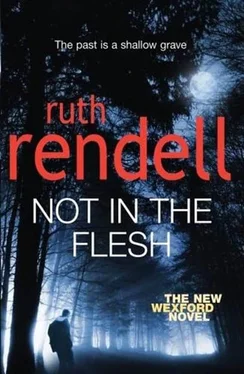There was no question of Vivien and me going to bed. We stayed up with Mum, waiting and hoping and sometimes doing that ridiculous thing of running to the front door and out to the gate to look up and down our street. Viv and I did it four or five times, and then Mum said to stop because it was raining so hard and we came in soaked. She kept saying, “I wish the rain would stop, I wish it would stop,” as if it made things worse, Dad being out in the rain.
Eventually, we went to bed but we couldn't sleep, and we heard Mum go downstairs and walk about and come back up again and go down again. She came into our room in the morning and said we had to go to school, it would turn out that there was some simple explanation for Dad not coming home, but we could tell she didn't believe this, and after a while she said we need not go. It was better for us to be here with her, she needed us here. And then she gave an awful sort of sob as if her heart would break.
She went to the police station at about nine and we went with her. It was true what she'd said, she didn't want to be anywhere without us. She filled in the missing-person form and the policeman who was looking after us said she wasn't to worry as he was sure to be back that day. In fact, he said, the police didn't search seriously if fit healthy men of his age-he was forty-four-went missing. It wasn't like children and young girls or old people. Most men of his age, “the vast majority” he said, came back within seventy-two hours. My mother thanked him and said he was very kind, but even then, at that early stage, she knew my dad hadn't done any of the things other people suggested, gone off with another woman, gone away to start a new life somewhere, been on a binge, wakened in a strange bed, and been afraid to go home. Even then, she was saying he must be dead.
Next week: Selina tries to discover the secrets in the life of her father, Alan Hexham. These extracts are from Gone Without Trace: The Lost Father by Selina Hexham, to be published by Lawrence Busoni Hill in January 2007.
Damon Coleman had interviewed her and later so had Burden. Both had reported her as difficult, prickly, and old-fashioned. Wexford's experience of Mrs. Irene McNeil consisted of the letter she had written him, and that had led him to expect a deeply conservative woman, a snob, her ethos centered in another, long-past age. Still, he thought he would be talking to someone with more sense and more dignity than the Tredown women.
What he didn't expect was that he would feel sorry for her. It wasn't her great lumbering girth and the fact that she had to use a stick-would soon need two sticks-which provoked his pity. It wasn't her apparent distress at coping with disability or the pain in her arthritic limbs but, rather, something in her eyes, a bewilderment at finding herself ending up alone here in a house that, though she had been there for nearly eight years, was still new and alien to her, without child or friend or companion. He told himself that whatever she told him, whatever he and Burden found out from her, he must be gentle and considerate.
The house that she and her husband had bought because it was near the shops and on a bus route-the bus went just twice a day-and “easy to run” had evidently been designed for a young couple out at work all day. Its interior was stark, lined with built-in cupboards, ceiling eyelet lighting, hardwood laminate floors. There was something pathetic about Mrs. McNeil's padded, buttoned velvet furniture in this minimalist setting, her footstools and cushions and ornaments crowded together and seeming to jostle one another.
Her husband had had his first stroke eight years before and had died six months after they moved in, when they were still at the stage, Mrs. McNeil said, of saying to each other that they would settle down, they would get used to it. She had had to get used to it alone. Wexford's recalling her mind to Flagford Hall, the house that she had left behind, let forth a flood of reminiscence. Mrs. McNeil spoke in a steady complaining whine, the voice of a woman who has left all life's pleasures in the past and to whom the present is all labor and sorrow.
“Even with that dreadful man Grimble living opposite, we were comfortable and peaceful there.” Sweat trickled down her cheeks. “It was my husband's family home. You could call it his ancestral home. His family had lived there for generations. The house is perfect Queen Anne, you know, and the gardens are gorgeous-or they were, I don't suppose they are now. As for this place, you wouldn't believe the noise there is at night here, louts and young girls drunk and screaming in the street. Even on the day Mr. Grimble turned that young man out, when he put his furniture out into the front garden, there was nothing like I get here.”
“Let me take you back to that time, Mrs. McNeil.”
“I wish you could,” said Mrs. McNeil bitterly.
“I believe you kept watch on the house that had belonged to Mr. Grimble after he was dead and it belonged to his son. Nothing wrong in that. In fact, very commendable-we might well call it neighborhood watch.” Wexford avoided Burden's satirical eye. “Did you see many people go in there, apart of course from Mr. John Grimble himself?”
“He never went in there much. He wasn't interested. He told Mrs. Hunter and Mrs. Hunter told me it was a load of old junk-those were his very words. It was only fit to be burnt and that was what he intended to do once he got his planning permission. Have a bonfire of the lot, he said, and then demolish the place. An old white elephant, he called it. We're opposing his planning application, Mrs. Hunter said, and I said so were we.”
Old and lonely, she was relishing pouring out her memories to a sympathetic ear. There could be, when he chose, something in Wexford's manner that invited confidences from those who had little opportunity to air their miseries and their grievances. During a quarrel over their respective lifestyles, his daughter Sylvia had said to him, “You ought to have been a bloody psychotherapist.”
“Well, it looks as if you were successful as permission was refused,” he said. “Did anyone else go in there? I don't just mean immediately after Mr. Grimble senior was dead but in the months and even years to come. I'm sure you didn't relax your surveillance.”
“Oh, no. I kept up my neighborhood watch, as you called it.” She seemed well contented to see herself in the role of local special constable. “As to your question, several people went in there. One evening I saw a woman who used to work in the chemist's shop go in there with a man I'd never seen before. You could guess what they were up to.” When Wexford made no comment, she went on, “My husband saw Mrs. Tredown go in there one day. I mean the second Mrs. Tredown, the one with the yellow hair. Of course none of these people went in by the front door. Mr. Grimble had boarded up the front door. All of them sneaked around the back.”
“Mrs. McNeil, you're being very helpful.” Wexford knew she was lying. He could tell by her tone rather than her body language. Of that she had none, for she remained in the only position possible to her, a heavy slumping among cushions and shawls. She was one of those rare people who allow their hands to rest quite still while they talk. “Can you tell me how these people got into the house? They can't all have had a key, can they?”
Falsehood promptly became truth. “Oh, he always kept his back-door key under a lump of stone outside the back door.”
“And people knew that? All these people?” This was Burden. Wexford wished he hadn't intervened. His voice was abrupt and incredulous and Mrs. McNeil plainly resented it.
“I don't like your tone, whoever you are.” She seemed to have forgotten she had seen him before. “I was talking to this gentleman.” She turned back to Wexford. “They must have known, mustn't they?” she said like the little girl she had been so long ago. “I expect they told each other. Yes, that would be it.”
Читать дальше











